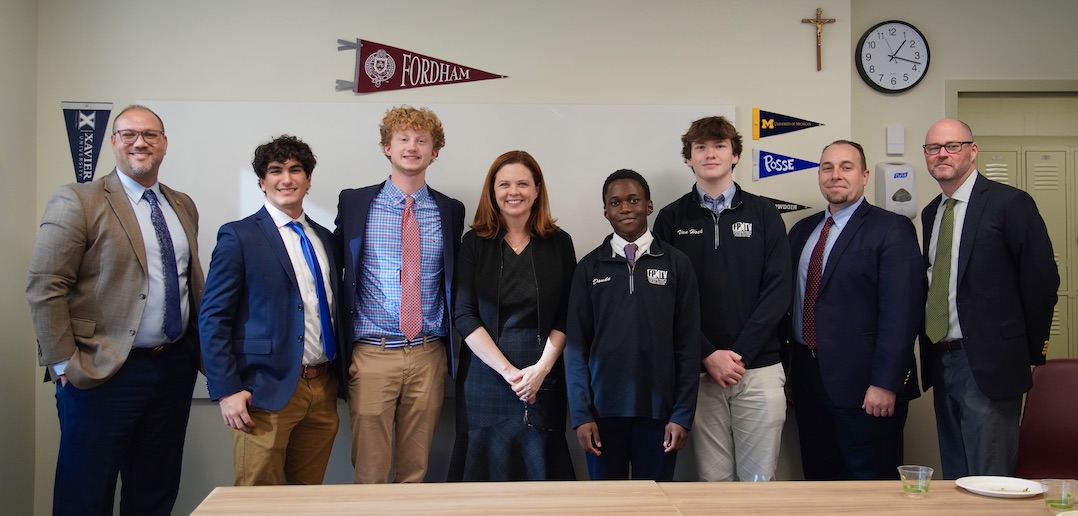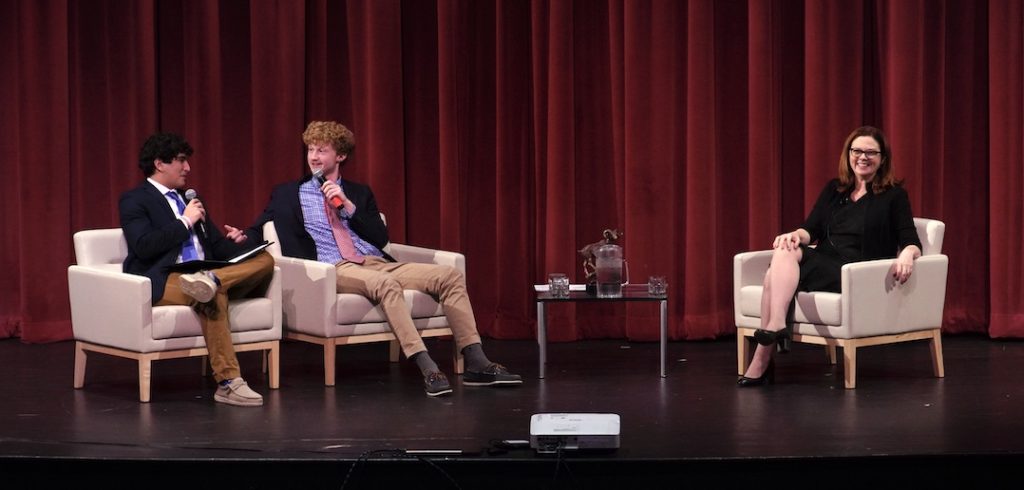“You will be adults—or adult-ish,” Tetlow said to about 500 juniors and seniors on Nov. 29. “It is where you get the blessing and the challenge of free will, and you get to decide for yourself who you want to be.”
Fordham Prep is an all-boys Catholic Jesuit secondary school located on the northern tip of the Rose Hill campus. It was established on the same day as Fordham University, on June 24, 1841, and by the same person—John Hughes, an archbishop of New York.
In Fordham Prep’s main auditorium, Tetlow was interviewed by two seniors, Peter Canale and Ryan Irving, who host the school’s student-run podcast Ramblin’. Their questions ranged from funny to serious, starting with a few controversial takes: Would you rather have a classic bacon, egg, and cheese sandwich from New York City or a po’ boy from Louisiana? A New York style cheesecake or a beignet? (“A po’ boy,” she instantly answered, to a chorus of good-natured boo’s from the boys. She chose cheesecake for dessert, to whooping and applause from the audience.)
What Makes a Jesuit Education Unique?
They also discussed deeper topics, including the benefits of a Jesuit education.
“The Jesuits were scientists, explorers, and cartographers. They documented languages. There are 35 craters on the moon named after Jesuit astrologers. Did you know that?” she said, to a chorus of noes. “They really helped to create education as we know it.”
Tetlow said that the Jesuits developed schools that were so amazing that they attracted many children of the elite, but the Jesuits also tried to make education available to students from disadvantaged backgrounds. “That was a pretty radical thing for the 1500s, of trying to make sure that people got to have that opportunity beyond just the richest families,” she said.
The third thing that makes a Jesuit education unique is that it’s not really meant for the students themselves, she said. “It’s to make you into the kind of men who go out and matter to the world. It’s to arm you with the skills you need—the discipline, the hard work, the knowledge, all of it—but not just so you can have lives where you’re seeking status or money or the superficial kinds of things, but that you can have purpose,” she said.
At an all-boys school like Fordham Prep, there are some advantages, Tetlow said.
“You can challenge each other on a different version of what it means to be a person, that being a man means being a person with integrity who cares about other people, who is honest and honorable [and reinforce that in each other],” she said. “I saw this with my dad and all my uncles who went to a Jesuit high school in New Orleans.”
‘I Thought I Knew Who She Was’
In an auditorium full of students getting ready to apply to college or waiting to back from schools they had applied to, Tetlow also talked about why higher education is important. College is a place where you learn how to explain your thoughts to the world in a way that everyone can understand, no matter what career you choose, she said. It’s a home where you find people who are similar to you, while connecting with others who come from different worlds. And it’s a place where you rethink your biases.
Tetlow recalled the first course she ever taught, where she had a student who fell asleep in every class. At first, she thought the student wasn’t paying attention because she came from a privileged background. But after their last class, the student approached Tetlow and apologized. It turned out that she was working three jobs to make her way through law school and support her two younger siblings through college. Their parents were drug addicts. Once she came of age, she fought her parents for custody. The case went all the way to the Supreme Court—and she won, said Tetlow.
“I thought I knew who she was, and I didn’t. So you get to learn more of that. You get to learn it in a diverse school like this. You get to learn it … going to college, being in school with women and how to engage with them in a different way—of meaningful respect and relationships … and figuring out that overlap of what you’re really good at and what you love doing,” Tetlow said.
Navigating Life As A 16-Year-Old College Student
Life has given Tetlow many experiences, including attending college at age 16, she said.
“Socially, I was not prepared for college. I lived in the dorm with everybody else. I was not terribly cosmopolitan and sophisticated at 16 years old, so I spent the whole first year being like this: ‘Oh my Gosh! What am I seeing?’” she said, while the audience chuckled. “I think what’s more important in your education than learning fancy math and reading important novels is this emotional development you have as a child. … That is one of the most important things you’re learning at this age: how to have a friendship, how to have a relationship, and how to treat people well.”
But the biggest lesson she learned over the past five decades is how to understand people: what drives them, what they care about, and how to communicate with them, she said. It’s a skill that’s hard to teach in a classroom, and it’s difficult for managers to teach that to their employees. But it’s a skill that often determines your success in life, she said.
In his closing remarks, Fordham Prep’s principal, Joseph Petriello, thanked Tetlow for visiting their school.
“We want to thank you for sharing your ambition, humility, and creativity with us today,” said Petriello, who is a double Fordham University alumnus and an adjunct faculty member himself. “You are an inspiring witness to our shared mission—our Catholic Jesuit mission that has really united our schools since 1841.”





